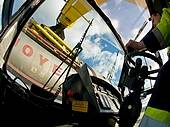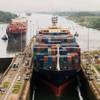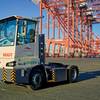Kiel Well-Placed for 2012
Port handles more than six million tons for the first time.
Kiel, January 17 2012: The Port of Kiel turned round more than six million tons of cargo last year for the first time ever. It posted a turnover figure of 6,293.374 tons exactly at the turn of the year - an increase of 8.5 % over the previous year. The Managing Director of the Port of Kiel (SEEHAFEN KIEL GmbH & Co. KG) Dr Dirk Claus said “thanks to the shipping companies and the port working hand in hand, we have together achieved a top-notch result, won additional shares in the market and gone into 2012 well-placed for the future”. The growth has been mainly down to the ferry lines serving Scandinavia, Russia and the Baltic region. Together they account for 80 % of the total tonnage handled. While conventional cargo handling rose strongly by 17.3 %, bulk cargo handling declined by 18 %. The annual results were presented during a press reception hosted jointly by Dirk Claus and the managing directors of the local shipping companies DFDS Seaways (Jacob Andersen), Stena Line (Stefan Mathias) and Color Line (Dr. Jörg Rudolph).
Ferry traffic shows strong growth, accounts for 80 % of all handling
The five ferry lines operating out of Kiel carried a good 5 million tons of cargo in 2011 (compared to 4.2 million tons in 2010). Carrying most cargo was the Kiel-Klaipeda service of DFDS Seaways while Stena-Line’s Kiel-Gothenburg route posted the biggest cargo growth rate. New as of May 2011 was the route between Kiel and Ust Luga in Russia, served once a week by the “Kaunas”. Dirk Claus said “the new RoPax ships of Stena Line and DFDS Seaways are giving the Port of Kiel a gigantic boost. We have invested in all parts of the port in order to fully meet the growing demands of all our customers both now and in the future”, he added. In 2011 alone, investment totalled 17.5 million Euros.
For the first time the number of trucks, trailers and containers carried in ferry traffic via Kiel passed the 250,000 mark. The figure in 2010 was 205,000 units. Traffic in unaccompanied units showed particularly strong growth – with 24 % more trailers and as many as 80 % more containers moved. Against this background, rail cargo continued to gain in importance with intermodal road/rail volumes alone growing from 10,500 units in 2010 to 19,500 in 2011. The combi-shuttle time-table of rail services between Kiel and Hamburg-Billwerder has, in the meantime, been expanded to six departures a week in each direction. Dirk Claus said “increased intermodal volumes have made an expansion of rail services possible. We are now working with partners on the creation of block train services to northern Italy”.
In passenger traffic to and from Kiel, some 1.94 million travellers were recorded - 1.9 % fewer than in 2010 - of whom 1.5 million were ferry passengers. In a year in which it also marked the 50th anniversary of its Kiel-Oslo service, Color Line was able to post another increase in passenger totals – reporting well over a million travellers. DFDS Seaways also carried more passengers to and from Klaipeda while Stena Line and its new RoPax ships with less passenger capacity was not able to achieve the growth rate of the previous year.
Schwedenkai Terminal restructuring completed
The extensive restructuring of facilities at the Schwedenkai Terminal was completed at the start of September 2011. Inside three years a high-performance quay facility capable of handling both big ferries and cruise ships was created at an investment cost of more than 30 million Euros.
“The introduction of a new generation of Stena Line ships would not have been possible without the restructuring of the Schwedenkai Terminal”, said Dirk Claus. “And the Schwedenkai has the potential for further growth”, he added. In 2011, about 100 new jobs were created at the terminal and more than double the volume of cargo was handled there than before the restructuring – despite the fact that terminal handling in the second half of the year was not as strong as in the first half.
Construction work on the north easterly extension of the Norwegenkai was also largely completed in 2011. About 9,000 m² of additional operational space was created and made available for port usage, mainly as parking areas for trailers. With the financial support of the state of Schleswig-Holstein, about 1.5 million Euros were invested at the Norwegenkai.
The SEEHAFEN KIEL last year bought two large warehouses and other covered areas in the port’s most important cargo handling region, the Ostuferhafen, to meet an increasing demand for suitable storage space. The company can now offer a total of about 30,000 m² of covered warehousing.
During 2012 further expansion of the Ostuferhafen’s cargo and logistics capacities will take place. This undertaking will also involve the fitting-out of Berth One for handling big cruise ships. By the 2013 cruise season the Ostuferhafen will have been expanded so that cruise ships of 300 and more metres in length will be able to berth there and exchange passengers. Making the Ostuferhafen fit for this job will involve an investment of 4.8 million Euros and cover quayside and berth adjustments, safety facilities, the conversion of the existing RoRo Berth Number 1 and the improvement of gate processing facilities. In addition, a new computer-supported terminal management system called Yard-IT will go into operation this year.
140 cruise ship calls in 2012, including 9 Kiel firsts
Kiel was visited 120 times last year by nineteen different luxury liners. A total of 377,205 passengers boarded or disembarked from a cruise ship. That was 10.4 % more passengers than in 2010. The total tonnage of ships handled was 8.7 % up at 7.49 million GT for the first time. “That means that in 2011 Kiel was once again the most popular German turnaround port for cruises with the highest number of passengers” said Dirk Claus.
As of now, 140 visits by 27 different cruise ships have been registered for 2012. The season gets underway on March 31st, which is earlier than in previous years, with the arrival of the “AIDAcara”. The most frequent guests are the ships of the shipping companies AIDA, Costa, MSC and TUI Cruises, which, along with the ships of numerous other well-known classical German operators, turn around in Kiel. For the first time MSC Crociere is sending three ships to call at Kiel – “MSC Magnifica”, “MSC Poesia” and the “MSC Lirica”. During the Kieler Woche Regatta from June 16th to the 24th, 13 cruise ships will visit the port a total of 16 times as well as the “Star Flyer” under sail. This year no fewer that nine cruise ships will make their first-ever visits to Kiel, among them the “Queen Elizabeth” expected at the Ostseekai Terminal on July 24th.
Although first and foremost a start and destination port for cruise ships, Kiel is also gaining significance as a jumping-off port for daily excursions. Dirk Claus said “the number of ships visiting Kiel with international guests on board is rising markedly this year. Our efforts to market Schleswig-Holstein as a tourist destination are beginning to bear fruit. This sector still has enormous potential that we, along with the state’s tourist operators, must exploit”, he added. Ships like Holland-America Line’s “Eurodam” and “Rotterdam” are among those which will visit Kiel this year during an ongoing cruise. The final guest of 2012 will be Fred Olsen’s “Black Watch” which will visit Kiel on December 2nd as part of an Advent cruise.
SEEHAFEN KIEL takes over airport company
The SEEHAFEN KIEL now also operates Kiel Airport. The relevant decisions were taken by the Council of the Federal State Capital of Kiel with effect from January 1st this year. The task will be to secure the long-term survival of the city’s aircraft landing facility and at the same time to shape its development into an ‘airpark’ – an industrial park with an airstrip. “The integration of the airport company into the port group secures the existence of the airport’s location in Kiel and establishes the organisational foundation on which to develop the ‘airpark’ ”, said Dirk Claus. Kiel Airport covers about 100 hectares and boasts a runway of more than 1,300 metres in length for the use of commercial and private air traffic. The airport company has been trading since the start of the year as the Flughafen Kiel GmbH, a 100% subsidiary of the SEEHAFEN KIEL GmbH & Co. KG.
Belonging to the SEEHAFEN KIEL group of companies along with the airport company are SEEHAFEN KIEL Stevedoring GmbH (100 %), the firm Port Event Kiel GmbH (75 %) and 25 % of northrail GmbH. The group employed 200 people as of the start of the year - compared to 150 a year earlier. “The positive development of the port”, said Dirk Claus, “is reflected in the number of employees. All the companies in the SEEHAFEN Group created new jobs last year and took on new employees”, he said.
The SEEHAFEN KIEL operates Kiel’s commercial port on behalf of the Schleswig-Holstein state capital, of which it is a 100% subsidiary. Also part of the company is a railway transport concern with its own track and the Kiel marshalling yard. Kiel boasts a total of three modern passenger terminals for ferry and cruise ships at the Ostseekai, Schwedenkai and Norwegenkai - all of them in inner-city locations. Kiel is also a cargo handling hub trading with Norway and western Sweden as well as with the Baltic states and Russia. The logistic centre of Kiel is the Ostuferhafen , where liner shipping services with the eastern Baltic are concentrated. Along with its role as an international transit port, Kiel also serves an important function as a regional supplier of bulk goods.














